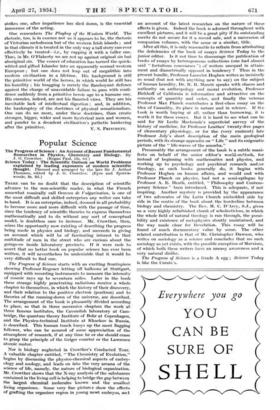Popular Science
The Progress of Science : An Account of Recent Fundamental Researches in Physics, Chemistry and Biology. By J. G. Crowther. (Kegan' Paul, 12s. 6d.) Science Today : The Scientific Outlook on World Problems explained by leading exponents of modern scientific thought. Planned and arranged by the late Sir J. Arthur Thomson, edited by J. G. Crowther. (Eyre and Spottis- woode, 8s. 6d.) THERE can be no doubt that the description of scientific advance to the non-scientific reader, in what the French somewhat comically call Oeuvres de Vulgarisation, is one of the most difficult and skilled enterprises any writer can take in hand. It is an enterprise, indeed, doomed in all probability to become more and more difficult with the passage of time, since the tendency of scientific theories to express themselves mathematically and to do without any sort of conceptual model, is doubtless sure to increase. Mr. Crowther, then, seizes the opportunity now existing of describing the progress being made in physics and biology, and succeeds in giving an account which will be of fascinating interest to that multitude of men in the street who are curious about the
goings-on inside laboratory precincts. If it were rash to assert that no better book on popular science has ever been written, it will nevertheless be undeniable that it would be very difficult to find one.
The Progress of Science starts with an exciting frontispiece showing Professor Regener letting off balloons -at Stuttgart, equipped with recording instruments to measure the intensity of cosmic rays up to seventeen miles. Later in the book these strange highly penetrating radiations receive a whole chapter to themselve, in which the history of their discovery, and their relation to the positive electron (positron) and to theories of the running-down of the universe, are described. The arrangement of the book is pleasantly divided according to place, so that in three 'successive chapters the work at three famous institutes, the Cavendish laboratory at Cam- bridge, the quantum theory Institute of Bohr at Copenhagen, and the Physico-technical Institute at Kharkov in Russia, is described. This human touch buoys up the most flagging follower, who can be assured of some appreciation of the atmosphere of research, if at any time he or she should cease
to grasp the principle of the Geiger counter or the Lawrence atomic motor.
Nor is biology neglected in Crowther's Conducted Tour. A valuable chapter entitled, " The Chemistry of Evolution," begins by discussing the physico-chemical aspects of embry- ology and zoology, and leads on into the very arcana of the science of life, namely, the nature of biological organization. Mr. Crowther shows that the X-ray analysis of the substances contained in the living cell is helping to bridge the gap between the largest chemical molecules known and the smallest living organisms.. Some very fine picture s show the effects of grafting the organizer region in young newt embryos, and
an' account of the latest researches on the nature of these effects is given. Indeed the book is adorned throughout with excellent pictures, and it will be a great pity if its outstanding merits do not secure for it a record sale, and a succession of companion volumes, with the same or a similar, title.
After all this, it is only reasonable to refrain from attributing the deficiencies of the book of essays Science Today to the
junior editor. Is it not time to discourage the publication of books of essays by heterogeneous collections (one had almogt said " fortuitous concourses ") of writers unequal in attain- ment and diametrically opposed in tendency ? Thus in the present bundle, Professor Lancelot Hogben writes as incisively as usual (but not with anything new to say) on the subject of human heredity, Dr. R. R. Marett speaks with charm and authority on anthropology and moral evolution, Professor Birkhoff of California is informative and attractive on the concepts of quantity and order, and finally the veteran Professor Max Planck contributes a first-class essay on the idea of Causality, its place in nature and in science. If the- Look is worth" buying at all, rather than borrowing, it is worth it for these essays. But it is hard to see what can be said for Sir Leslie Mackenzie's superficial survey of the history of medicine, for Professor Leathes' twenty-five pages of elementary physiology, or for the (very eminent) late Professor Joly's short description of the main geological periods, with its strange appendix on " Life " and its enigmatic picture of the " life-waves of the amoeba."
Presumably the arrangement of the book is a subtle mani- festo on behalf of the senior editor's world-outlook, for
instead of beginning with mathematics and physics, and working up to psychology and psychical research and/or theology, as such books generally do, it begins with
Professor Hogben on human affairs, and would end with Professor Planck on physics, had not a semi-epilogue by Professor A. E. Heath, entitled, " Philosophy and Contem- porary Science " been introduced. This is adequate, if not inspiring. Another mystery is provided by the appearance of two advocates of the Latin Church embedded side by side in the centre of the book about the borderline between biology and chemistry. The Rev. M. C. D'Arcy, S.J., gives us a very highly refurbished chunk of scholasticism, in which the whole field of natural theology is run through, the possi- bility and existence of metaphysics stoutly maintained, and the way made clear for Revelation. This essay will be found of much documentary value by some. The other related contribution is that of Mr. Christopher Dawson, who writes on sociology as a science and concludes that no such sociology as yet exists, with the possible exception of Marxism, of which both these writers have an uneasy awareness and a very natural dislike.
The Progress of Science is a Grade A egg ; Science Today is like the Curate's.












































 Previous page
Previous page